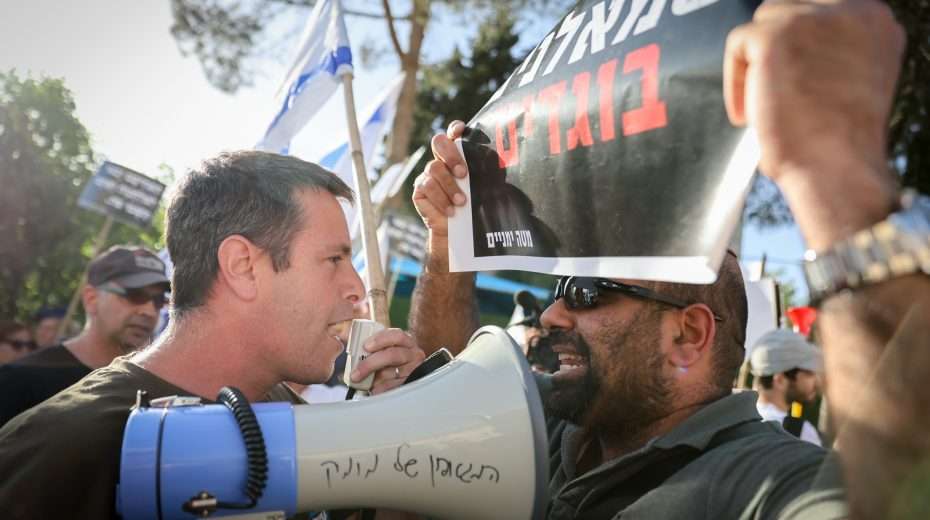The Knesset was set to vote today on a controversial bill that would limit scrutiny of the “reasonableness” of elected officials’ decisions. This would give the government a possible loophole to overrule the judicial system in an emergency. The bill is to be rushed through the legislative process so that it can enter into force by the end of the summer session of the Knesset on July 30. Tonight, the first of three necessary votes is to take place in plenary. Tomorrow, opponents of the reform are planning nationwide disruptions. Transport and the economy are to be paralyzed. The demonstrators shift into second or even third gear. Israel’s two recent military operations, in Gaza and Jenin, briefly sidelined popular strife, but now it’s back to full speed ahead.
The idea of “reasonableness” is a legal test that allows the Supreme Court to overturn governmental and administrative decisions that have not taken into account all relevant considerations or have not given proper weight to those considerations. The coalition insists curtailing this mechanism because so far the doctrine of reasonableness has given too much power to the judicial system. Critics, on the other hand, say that the reasonableness test is an important tool against state abuse. Legal scholars and politicians have put forward various proposals to limit reasonableness, with the coalition’s current bill representing the most extreme move against it.

High-tech, universities and shopping malls plan to halt their work tomorrow if the bill passes the first reading tonight. Not only that, Israeli reserve soldiers from numerous units, particularly the elite and special forces, are threatening to suspend their voluntary service if the law is enforced by the right-wing national coalition. Israel’s Air Force is also approaching an unprecedented crisis, as a large number of reserve pilots have threatened to refuse to report for duty if the bill is passed.
A so-called learning day will take place tomorrow, where hundreds of active combat pilots will listen to various experts to understand the consequences of lifting the reasonableness clause. This emergency meeting looks like a signal to the government that the Israel Air Force’s readiness will be reduced if judicial oversight is reduced.
“From discussions with a number of Air Force fighter pilots and navigators who are volunteering in the reserves, there is no doubt that the outcome of this emergency meeting was an official announcement of the cessation of volunteer duty by hundreds of fighter pilots and other flight crew in the Air Force reserves,” wrote the Israeli newspaper Maariv. This will have enormous consequences for the readiness of the Israeli Air Force, especially in relation to a possible multi-front war, which everyone has been warning about in recent months. Israel’s Air Force fighter fleet relies heavily on reserve pilots and navigators, who are required to do flight training at least once a week. In every Israeli Air Force attack or operation, even on relatively normal days, many reserve fighters take part.

Without the squadrons and other air units, which consist of many hundreds of fighter pilots and other air combatants, Israel’s wartime readiness and air force capability is severely limited. In the Israeli media, this is considered unprecedented in Israel’s state history. A few months ago, in March, the Air Force was faced with the announcement by dozens of reserve pilots from Squadron 69, one of the Air Force’s elite squadrons, that they would not be showing up for a reserve day. The incident shook the top of the Air Force and the Israeli army. In response, the Israeli Air Force commander, General Tomer Bar, suspended Colonel Gilad Peled, one of the Air Force’s senior fighter pilots.
A short time later, Bar came to his senses and reinstated Col. Peled. Other fighter pilots also returned to work after the judicial reform process was stalled during negotiations at the President’s Residence. But now everything is moving forward, this time at full throttle, because from their point of view the government is crushing Israel’s democracy.
The main reason why Israel’s Chief of Staff Herzi Halevi and Gen. Bar have so far preferred not to suspend or dismiss fighter pilots is recognition of the depth and intensity of the crisis. In recent months, both have spoken to numerous fighter pilots, navigators and senior officers in various squadrons. It is not a passing whim, but a deep worldview of what the State of Israel should look like. They understood that hundreds of fighters will end their voluntary service in an army which, in their view, is no longer the army of a democratic state, much less a people’s army.

Reasonableness is not the issue, but just one trigger among many. In recent weeks, protests in the country against the judicial reforms had subsided, but this was due to military operations. As it stands now, each side ignores the other. Each side shifts into higher gear. The coalition wants to push through a large part of the judicial reforms unilaterally, and on the other hand the opposition and opponents of the reform threaten to turn the country against the government’s plans. Everyone talks and preaches for or against reasonableness, but where is the reasonableness among the people? Isn’t it reasonable to be siblings first and listen to one another? But nobody is able to do that at the moment. Not the government, not the opposition, not the right and not the left.














